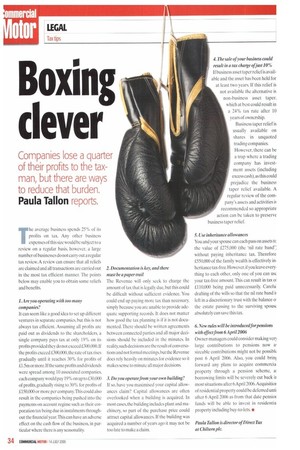Boxing clever
Page 34

If you've noticed an error in this article please click here to report it so we can fix it.
Companies lose a quarter of their profits to the tax man, but there are ways to reduce that burden.
Paula Tanon reports.
The average business spends 25% of its profits on tax. Any other business expenses of this size would be subject to a review on a regular basis, however, a large number of businesses do not carry out a regular tax review. A review can ensure that all reliefs are claimed and all transactions are carried out in the most tax efficient manner. The points below may enable you to obtain some reliefs and benefits.
L Are you operating with too many companies?
It can seem like a good idea to set up different ventures in separate companies, but this is not always tax efficient. Assuming all profits are paid out as dividends to the shareholders, a single company pays tax at only 19% on its profits provided they do not exceed £300,000. If the profits exceed 000.000, the rate of tax rises gradually until it reaches 30% for profits of £1 .5m or more. If the same profits and dividends were spread among 10 associated companies, each company would pay 19% on up to £30,000 of profits, gradually rising to 30% for profits of 1150,000 or more per company.This could also result in the companies being pushed into the payments on account regime such as their corporation tax being due in instalments throughout the financial year.This can have an adverse effect on the cash flow of the business, in particular where there is any seasonality. 2. Documentation is key, and there must be a paper trail The Revenue will only seek to charge the amount of tax that is legally due. but this could be difficult without sufficient evidence. You could end up paying more tax than necessary, simply because you are unable to provide adequate supporting records. It does not matter how good the tax planning is if it is not documented. There should be written agreements between connected parties and all major decisions should be included in the minutes. In reality,such decisions are the result of conversations and not formal meetings, hut the Revenue does rely heavily on minutes for evidence so it makes sense to minute all major decisions.
3. Do you operatefrom your own building?
If so. have you maximised your capital allowances claim? Capital allowances are often overlooked when a building is acquired. In most cases, the building includes plant and machinery, so part of the purchase price could attract capital allowances. If the building was acquired a number of years ago it may not be too late to make a claim. 4. The sale of your business could result in a tax charge ofjust 10% If business asset taper relief is available and the asset has been held for at least two years. If this relief is not available the alternative is non-business asset taper. which at best could result in a 24% tax rate after 10 years of ownership.
Business taper relief is usually available on shares in unquoted trading companies.
However, there can be a trap where a trading company has investment assets (including excess cash),as this could prejudice the business taper relief available. A regular review of the company's assets and activities is recommended so appropriate action can be taken to preserve business taper relief.
5. Use inheritance allowances You and your spouse can each pass on assets tc the value of £275,000 (the 'nil rate band-, without paying inheritance tax. Therefore f...550,000 of the family wealth is effectively inheritance tax-free. However, if you leave everything to each other, only one of you can use your tax-free amount. This can result in tax 01 £110,000 being paid unnecessarily. Carefu drafting of the wills so that the nil rate band left in a discretionary trust with the balance 0. the estate passing to the surviving spouse absolutely can save this tax.
6. New rules will be introduced for pensions with effectfrom 6 Apri12006 Owner-managers could consider making yen large contributions to pensions now a! sizeable contributions might not be possible post 6 April 2006. Also, you could brinl forward any plans to acquire commercia property through a pension scheme, a: borrowing limits will be severely cut back ir most situations after 6 April 2006. Acquisitim of residential property could be deferred unti after 6 April 2006 as from that date pensioi funds will be able to invest in residentia property including buy-to-lets. • Paula Tallon is director of Direct Tax at Chiltern pk










































































































































































































